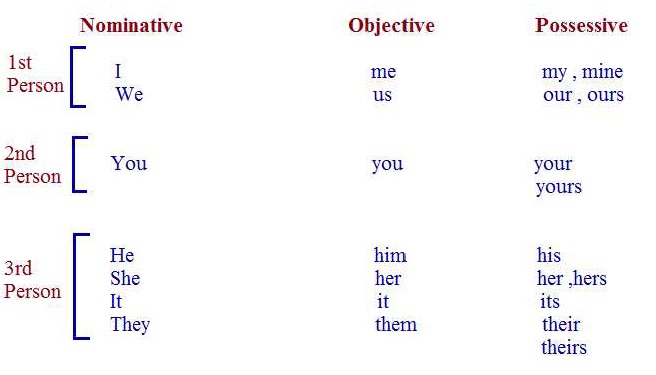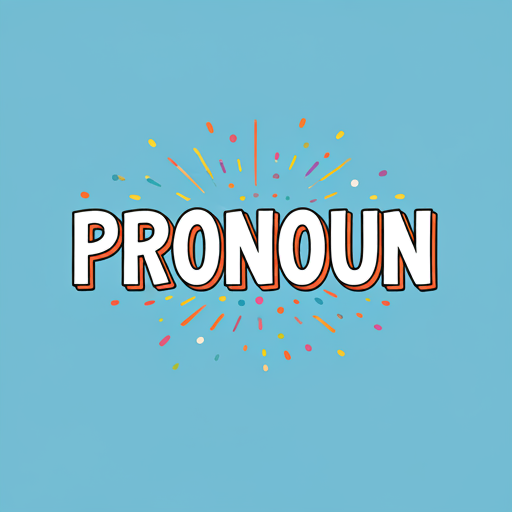Pronoun is Used in place of ‘Noun’.
Eg: He is playing football. { He is Pronoun}
Pronoun Examples → He, she, his ,they ,we , us , me , my , mine , I , you , it , ours , your , your, hers , her, its , their , theirs
Types
- Nominative : Used as a subject in the sentence.
Examples → I , We , You etc.
2. Objective : Used as an object in the sentence on which work is going on.
Examples → me , him , her , it etc.
3. Possessive : Pronouns which show possessiveness.
Difference Between ‘ my ‘ & ‘ mine ‘
→ ‘ my ‘ is used before the noun.
→ ‘ mine ‘ is used after the noun.
Example-
- This is my friend.
- This is the friend of mine.
- This is my book.
- This Book is mine.
*friend and book is noun here.
Difference Between ‘ your ‘ and ‘ yours ‘
→ ‘ Your ‘ used before the ‘ noun ‘.
→ ‘ Yours ‘ used after the ‘ noun ‘.
Example-
- I saw one of your friends last night.
- I saw a friend of yours last night.
*friend is noun here.
Table of Pronoun

OBJECTIVE PRONOUN
Rule 1: After Preposition we have to use objective pronoun.
Example :
- He depends on
they.[Incorrect] - He depends on them. [Correct]
{Here ‘on‘ is preposition and this is nominative pronoun so ‘they’ is replaced by ‘them‘]

Example :
- He plays with
I. [Incorrect] - He plays with me. [Correct]
Difference between ‘ I ‘ and ‘ me ‘
‘ I ‘ is used as a subject , which is do some work.
me ‘ is worked as object on which work is going on , so it always used as a object , is a
objective noun and used after preposition.
Rule 2: After ‘ Let ‘
Objective pronoun is used after ‘ Let ‘
Examples:
- Let
wego there. [‘We’ to be replaced with ‘us‘ to make the sentence correct] - Let
theyplay cricket. [Replace ‘they’ with ‘them‘]
NOMINATIVE PRONOUN
Rule 3: After ‘Than’
When there is any comparison between two , then nominative pronoun is used.
Examples:
- He is better than you.(Correct) [‘you’ of nominative case]
- He is better than
me.(Incorrect) [Replace ‘me’ with ‘I’, to make sentence correct. - He runs as fast as
them.(Incorrect) [Replace them with ‘they·’]
[‘fast’ is a positive degree of adjective proceed and followed by ‘as’ so this phrase work as comparison, so nominative case applied.]
- His efforts will bring him more success than yours.
- You should be true to your word. or One should be true to his word.
- The dog I have bought looks more ferocious(wild) , than the one you have. .
- Yours are the same problems as mine.
REFLEXIVE PRONOUN
Transitive verbs : Verbs which requires object after them, those are known as transitive verb.
Example:
Children fly kites.
[ here fly acts as transitive verb because children fly doesn’t make any sense, So noun is used to complete the sentence Those verbs which always comes along with Pronoun or noun is known as transitive verb ]
Birds fly.
[ Here fly is not a transitive verb ]
Some verb which act as transitive verbs
- cut
- kill
- introduce
- hurt
- eat
- absent
- hit
- watch
- avail
- cheat
- prostrate
- enjoy
Example :
He introduced himself to the director.
We use a reflexive pronoun as object or complement when it refers to the same thing as the
subject. The pronouns which are used with transitive verb as a object are known as reflexive
pronoun.
Reflexive Pronoun are :
- he → himself
- her → herself
- it → itself
- they → themselves
- I → myself
- you → yourself
- we → ourselves
- one → oneself
Examples:
He absented himself from the class. [transitive verb]
He remained absent from the class. [In-transitive verb]
[ here, absent not work as transitive verb , it is used as adjective so reflexive pronoun is not used here]
He prostrated himself before his master, who had come from London after a year.
The officer as well as the assistants absented themselves from the office.[ Correct ; himself ]
[ In the sentence there is ‘ as well as ‘ used with which verb is changed to 1st noun or pronoun and here officer , so ‘themselves’ is changed himself.
Exception
Transitive verb does not use reflexive pronoun.
- Keep
- Stop
- Bathe
- turn
- qualify
- rest
- Hide
Example:
You should keep yourself away from the bad boys.
He hid himself behind the curtain.
In-Transitive Verb
Verb which does not require object.
Birds fly


